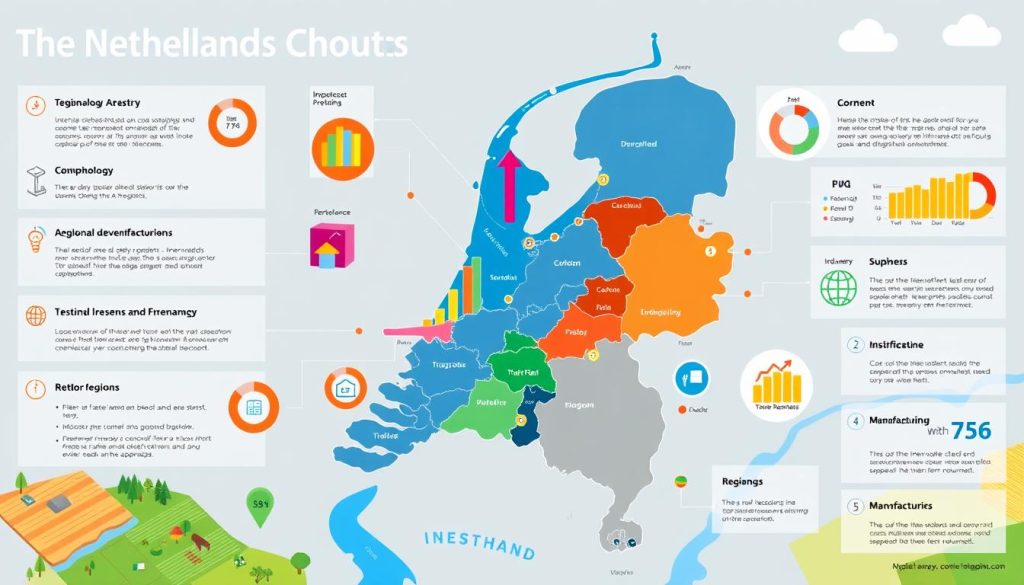In the Netherlands, structural business statistics are key to understanding our economy. They show how different businesses perform. This helps us see how our economy fits into the bigger picture of the European Union (EU) and EFTA regions.
These statistics give us important data. They help us analyze the economy, shape public policies, and track the economic impact. This is crucial for making informed decisions.
The EU’s business economy workforce hit over 160.1 million in 2022, adding €10,047 billion to the value added. Our focus includes various sectors. Manufacturing stands out, with €2,420 billion from about 2.2 million enterprises.
This shows how important SMEs are for our economy. They make up 99.8% of all EU enterprises. We explore how different businesses contribute to wealth, investment, and jobs in our economy.
Understanding Structural Business Statistics
When we look at how businesses work, we see that SBS data is key. It shows us important parts of business worlds. Knowing about SBS helps us see how businesses grow the economy.
By studying these stats, we learn about jobs and what sectors do best. This helps us understand the economy better.
Definition and Importance
SBS data gives us a detailed look at business structures. It’s crucial for making smart decisions in policy and economics. This data shows us what’s good and what’s not in different industries.
Small and medium-sized businesses are big in the EU economy. Studies and reports show their importance.
Sources of Structural Business Statistics
SBS data comes from trusted places like the CBS, Eurostat, and sectoral studies. These groups collect lots of data. This gives us a clear view of business activities in various sectors.
Using this data, we get insights for economic analysis and making public policies.
Role of Structural Business Statistics in Economic Analysis
Structural Business Statistics (SBS) are key in economic analysis. They give deep insights into different sectors. This helps in making better public policies to boost economic growth and stability.
For policymakers, having access to this data is crucial. It allows for careful planning and action to improve business performance.
Decision-Making for Public Policies
Insights from SBS shape public policies. They help us spot trends and patterns in business. This lets us create policies that encourage entrepreneurship and job creation.
Policymakers use this data to check their policies and adjust them. This ensures they stay on top of market changes. It helps build a strong economy.
Monitoring Economic Impact
Keeping an eye on the economic impact is vital. It shows how well policies are working. By looking at changes in business performance, we see what’s working and what’s not.
Structural business statistics help track these changes. They show the need for effective strategies that match today’s economy. Using these statistics helps us stay ready for future changes.

Structural Business Statistics in Netherlands
In the Netherlands, the business scene is diverse. It includes industrial, service, and construction sectors. Each sector plays a unique role in the economy.
Overview of Business Sectors
Services are the biggest part of the EU’s non-financial business economy. In 2022, distributive trades made up 18.1% and professional services 15.6%. Human health and social work activities were 7.3%.
The manufacturing sector was the biggest contributor to value added in 2022. It made about €2,420 billion. Distributive trade added €1,591 billion, showing their key role in the enterprise statistics.
Insights on Small and Medium-Sized Enterprises (SMEs)
SMEs in Netherlands are very important, making up 99.8% of all businesses. They add about 50.2% to the national value added. This shows their big role in keeping the economy stable and growing.
Also, SMEs employ nearly two-thirds of the workforce. This highlights their importance in keeping the labour market strong. Even though they are smaller, SMEs are key to the business economy’s health.
Key Indicators of Enterprise Performance
It’s key to know the main signs of how well a business is doing. In the Netherlands, two important ones are value added and labour input analysis. They help us see how productive and important different sectors are. These signs are crucial for checking how well industries do and their big impact on the economy.
Value Added and Economic Contributions
Value added shows how much each sector adds to the economy. In the Netherlands, sectors like manufacturing are big players. They create a lot of value, which helps jobs and growth. Looking at this, we see how different sectors help the economy, showing big differences.
Labour Input Analysis
Labour input analysis dives deep into how sectors use their workers. It shows the difference between full-time and part-time jobs. This is key for understanding productivity and spotting labour issues. By tracking this, companies can better manage their teams and work more efficiently, leading to better economic results.
Trends and Shifts in Economic Activities
The Netherlands’ economy has seen big changes, especially in how different sectors work and grow. Traditional industries are fading, while service-based ones are booming. This is thanks to what people want and new tech.
Sectoral Productivity Changes
Looking at how sectors perform helps us grasp the country’s economic shifts. Fields like ICT and healthcare are growing fast. This creates a more competitive market. It shows that while some areas might slow down, others are speeding up, changing the job scene.
Shifts from Industry to Services
The move from industrial to service-based economies is clear. Now, 81.6% of workers are in services. This shift meets the growing need for services and brings challenges for workers to learn new skills. Looking ahead to 2030, we must prepare for a shortage of skilled workers to keep the economy strong.
Regional Insights into Business Statistics
Looking into regional business statistics gives us a clear view of the Netherlands’ economy. We see how different sectors do well in certain places. This helps us understand the strengths of urban areas and how to grow the economy locally.
Comparison of Major Municipalities
Cities like Amsterdam, Rotterdam, and The Hague have unique economic profiles. Amsterdam is known for its creative industries, while Rotterdam excels in port and logistics. These differences show how each city contributes to the national economy in its own way.
Sectoral Distributions Across Regions
Different regions have different types of businesses. Big cities often have more tech and service sectors, while smaller towns focus on manufacturing and farming. This information helps us plan for growth in areas with potential. Using these statistics in our economic plans helps us meet local needs better.

Future Directions for Structural Business Statistics
Looking ahead, data innovation will be key for structural business statistics. We’ll be able to collect and analyse data more thoroughly. This will give us detailed insights into the economy quickly.
Such advancements will boost our ability to forecast the economy. This means businesses and governments can react faster to market shifts.
Real-time data will also help us understand businesses better. In 2021, the EU had 151,300 high-growth enterprises. This shows we can spot trends and opportunities for growth and jobs.
Also, 57.3% of EU regions had lower enterprise death rates in 2021. This is good news for business survival.
We should support projects like AIML4OS and MNO-MINDS. These involve many countries improving statistical methods. By linking these projects with our goals, we can keep structural business statistics useful. They will help shape public policies in a changing economy.
Our focus on the latest data innovations will shape the future of structural business statistics. This will benefit all parts of our economy.

